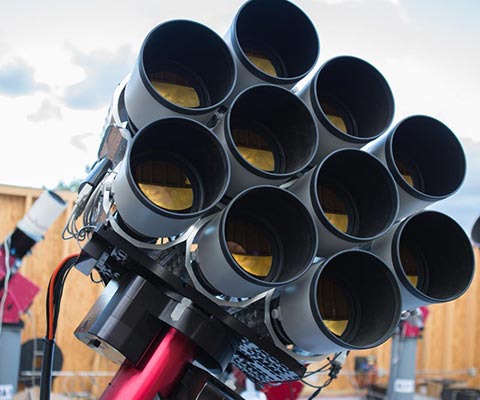An innovative telescope created at U of T’s Dunlap Institute for Astronomy and Astrophysics and Yale University has led to the discovery of a previously unknown type of galaxy, and is challenging established theories about how galaxies grow and evolve.
The Dragonfly Telephoto Array, co-designed by U of T astronomer Roberto Abraham and Yale’s Pieter van Dokkum, stitches together multiple high-quality off-the-shelf telephoto lenses to create a revolutionary type of telescope. Dragonfly is particularly well suited to spotting diffuse objects in the night sky. “We’ve already discovered a whole new class of galaxies that are as big as the Milky Way, but about a thousandth of the mass,” Abraham says.
Enormous galaxies with low mass should be “pretty fragile,” says Abraham, but Dragonfly has found them in clusters where astronomers might have expected them to be pulled apart or absorbed by more massive galaxies.
The key to the scope’s success involves an advanced glass coating on the lenses that keeps light from scattering as it passes through them. Light scattering would create “ghost images” that interfere with observations of diffuse objects. Each lens is attached to its own digital camera. The astronomers use software to “stack” multiple, nearly identical images to reveal never-before-seen celestial structures.
Dragonfly currently comprises 10 lenses, but the designers aspire to increase this to 40 by the end of 2015, at which point Dragonfly will have a combined aperture slightly bigger than the largest refracting telescope in the world. The inventors say Dragonfly will be 10 times better than any other telescope on the planet at detecting very diffuse objects – at a fraction of the cost.
Abraham makes it clear, though, that Dragonfly isn’t about doing more of the same with less: It’s about doing something altogether different.
“Dragonfly can explore galaxies whose properties make them undetectable using other telescopes,” he says. “We’re in an age of discovery with this thing. Who knows what we’re going to find?”






